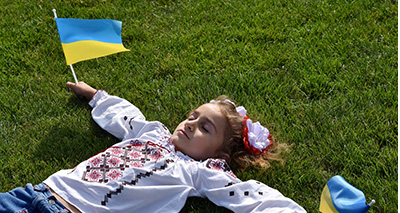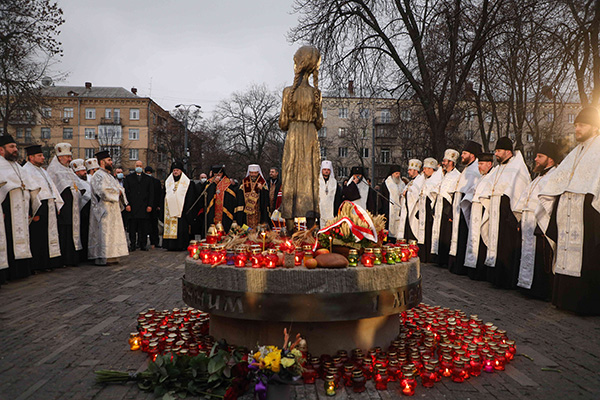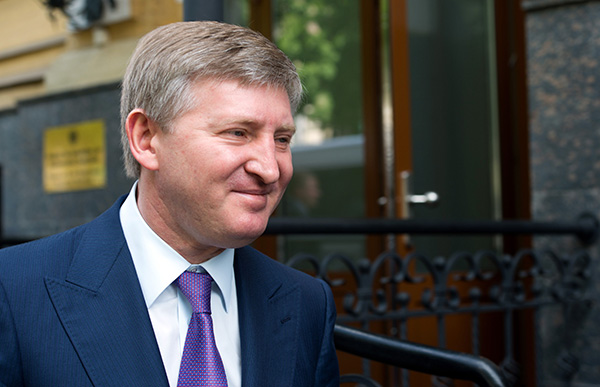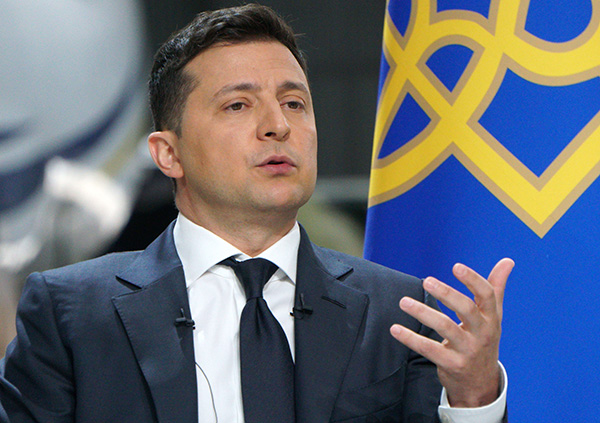(Credit Image: © Andriy Andriyenko/SOPA Images via ZUMA Press Wire)
This week, on August 24th, Ukraine celebrated its 30th year of independence from the USSR. In 1991, Ukraine had all the makings of a prosperous European nation: an educated population composed mostly of a homogeneous white ethnic group, an untapped market full of potential, and an abundance of natural resources.
Yet, of all the nations that emerged from the U.S.S.R, Ukraine’s fate has perhaps been the most tragic: a banking collapse, hyperinflation, opaque privatizations, corruption and the hostile oligarchy that emerged as a result, wages unable to keep up with inflation, political instability, and war with Russia.
Ukraine has shown that having a white supermajority is not enough. For while Ukrainians share the intelligence and creativity of Europeans, they lack the social norms — developed over centuries — that enabled their Western counterparts to build successful societies. Ukraine is an extremely low-trust society. This could be attributed to Soviet Communism, but there was low trust before then.
Ukrainian history is plagued by infighting and an inability to find common ground. Ironically, it was the Bolsheviks — hostile to Ukrainian nationalism — who in 1922 founded the first modern Ukrainian state to be recognized internationally (in exchange, of course, for helping to found the USSR).
The fractious Ukrainians were perhaps the nation most hostile to the totalitarian nature of the Soviets, and they paid a high price for it. Millions died in the Russian Civil War of 1917–1922, and in the artificial famines induced by the Communists (most notably the Holodomor genocide of 1932–33), and the Stalinist purges.
Priests of different Christian confessions serve a memorial service as people lit candles and lay bouquets from ears ang arrowwood to the memorial of Great Famine victims during mourning rally in Kyiv, Ukraine, November 28, 2020. Ukraine honors the memory of the victims of the famines and Great Famine (Holodomor) of 1932–1933 when 4.5 million Ukrainians, including 600,000 unborn children, were starved to death by the Soviet regime. (Credit Image: © Sergii Kharchenko/NurPhoto via ZUMA Press)
Millions more died during World War Two and, inevitably, Ukrainians were once again divided. Some in the west collaborated with the Germans to fight the horrors of Bolshevism, while the majority loyally served the Red Army. Alexander Solzhenitsyn noted that the number of Ukrainians was disproportionately high in the Soviet gulags.
Ukraine is now in the eighth year of a war waged by Russia to prevent, at minimum, Ukraine from joining the EU and NATO. So far, the strategy is working. Russia’s ultimate goal is to fragment Ukraine into two or three nations based on linguistic and religious divides, a strategy which has not yet succeeded.
From a racial perspective, Ukraine’s story is deeply disappointing. Boasting a population of 52 million in 1991, that number has fallen to 44 million and is still dropping. In recent studies, Ukraine has been among the top five countries in the world in terms of rate of demographic decline, ranking alongside Syria and Bosnia and Herzegovina — other war-torn countries. The fertility rate is 1.3 children per woman in 2018, below even Europe’s paltry average of 1.55.
Many millions have emigrated in a massive brain drain. Countless thousands have been trafficked into sexual slavery; Ukrainian women have a worldwide reputation for beauty and submissiveness. In this respect, history is repeating itself. Turks often took Ukrainians as slaves in raids — women for sex and even used men to serve in their armies. Now they come as sex tourists, rent hotel rooms, and pay for services at rates far above what the average Ukrainian can earn in a month. Tragically, many women willingly choose the sex trade because it pays so well.
The medical system is in shambles with the average doctor earning a few hundred dollars a month. Ukrainians call medical personnel, teachers, and professors “enthusiasts” since their only motivation is passion, not financial reward. The government has largely failed to maintain a functioning state — with a decent medical and education system — partly because of rampant corruption that drains the budget.
In the most blatant case in recent years, the government in 2016 had to nationalize the nation’s largest commercial bank, Privatbank, because it was being abused by its partners — Israeli citizens — in a so-called “vacuum cleaner” scheme to send millions of dollars in assets overseas, especially to the US.
The Justice Department is pursuing forfeiture of some of the assets acquired with these funds. In March, it also slapped sanctions against one of the partners — billionaire Igor Kolomoisky — who is under investigation for embezzlement and fraud.
Many think oligarchs are the problem, and justifiably so. These billionaires give practically nothing to charity, and they finance politicians who do their bidding, further fueling corruption. Oligarchs profit from the failures of the state. It’s clear they feel no obligation to improve the life of peasants, unlike even the Russian tsars before them. Perhaps a clue to their indifference is that they share no ethnic ties to the population.
The most notorious oligarch, billionaire Rinat Akhmetov, is a nominal Muslim and Tatar (they were among the people raping and pillaging Ukraine centuries earlier). When the Russians moved into his native Donbass in 2014, Mr. Akhmetov moved to Kyiv and formed a political alliance with another billionaire, Petro Poroshenko, who was elected president that year.
Rinat Akhmetov (Credit Image: © Bernd Von Jutrczenka/DPA/ZUMAPRESS.com)
Mr. Poroshenko is one of only a handful of Ukraine’s oligarchs who can claim Ukrainian blood, but it didn’t count for much. His presidency became notorious for corruption schemes and alleged profiting from the war in the Donbass. He became so disliked among the public that a Jewish comedian, Volodymyr Zelensky, defeated him in the 2019 presidential vote.
Mr. Zelensky has been able to maintain popularity far longer than Mr. Poroshenko, who is Ukraine’s least trusted politician, according to polls. After the US applied sanctions this year against Mr. Zelensky’s main sponsor, Igor Kolomoisky, the president switched his loyalty firmly to the IMF and Western NGOs.
Volodymyr Zelensky (Credit Image: © Irina Yakovleva/TASS via ZUMA Press)
Of course, these NGOs (sponsored by the usual suspects) only exacerbate the demographic spiral, promoting all forms of toxic feminism and sexual perversity. However, this is one of the few areas in which Ukrainians benefit from their humble inheritance. The ideas these organizations promote are so foreign to them that Ukrainians ignore them. “Inkliuziya” (inclusion) campaigns are increasingly benefitting special-needs people.
Those who most resent the Western agenda are throwing their support behind the pro-Russian political parties. After all, even under Soviet Marxism, a woman was expected to be married, have one or two children, and make a home. There is something to be said for the idea that Ukraine was better off in the Soviet Union. It’s hard to compare two societies so different, but that view is supported by the long lines of visa seekers every morning at the US Embassy in Kyiv, which has not shrunk in 30 years of independence.
Ukraine is a case study in how not to rebuild a nation after a collapse. It has ceded power to hostile and even parasitic oligarchs, most of whom are of foreign ethnic origins. But Ukraine’s problems are deeper. Its people spent centuries in slavery (even until 1974, when villagers were first allowed by the Soviet government to travel to cities) and have little experience of self-government or rule of law. That is a unique history for a white nation and a reminder of how diverse our race is.
Our best hope for Ukraine is that the killing between whites in Donbass — who once sang the same Soviet anthem — will end, and that Ukraine’s demographic hemorrhage will stop to allow for renewal and economic improvement.
I hope someday to see the British and Germans traveling to Ukraine for safe investments rather than the current spectacle of foreigners seeking exploitation.



